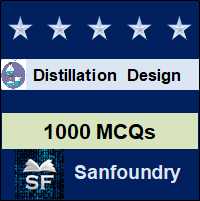
Distillation Design Multiple Choice Questions Highlights
- 1000+ Multiple Choice Questions & Answers (MCQs) in Distillation Design with a detailed explanation of every question.- These MCQs cover theoretical concepts, true-false(T/F) statements, fill-in-the-blanks and match the following style statements.
- These MCQs also cover numericals as well as diagram oriented MCQs.
- These MCQs are organized chapterwise and each Chapter is futher organized topicwise.
- Every MCQ set focuses on a specific topic of a given Chapter in Distillation Design Subject.
Who should Practice Distillation Design MCQs?
– Students who are preparing for college tests and exams such as mid-term tests and semester tests on Distillation Design.- Students who are preparing for Online/Offline Tests/Contests in Distillation Design.
– Students who wish to sharpen their knowledge of Distillation Design Subject.
- Anyone preparing for Aptitude test in Distillation Design.
- Anyone preparing for interviews (campus/off-campus interviews, walk-in interview and company interviews).
- Anyone preparing for entrance examinations and other competitive examinations.
- All - Experienced, Freshers and College / School Students.
Distillation Design Chapters
Here's the list of chapters on the "Distillation Design" subject covering 100+ topics. You can practice the MCQs chapter by chapter starting from the 1st chapter or you can jump to any chapter of your choice.- Introduction to Distillation
- Key Fractionation Concepts
- Column Process Design, Optimization and Shortcut Calculations
- Rigorous Distillation Calculations
- Batch Distillation
- Tray Design and Operation
- Tray Efficiency
- Packing Design and Operation
- Packing Efficiency and Scale Up
- Azeotropic and Extractive Distillation
1. Introduction to Distillation
The section contains multiple choice questions and answers on vapour liquid equilibrium.
|
|
2. Key Fractionation Concepts
The section contains questions and answers on theoretical stages, constant molar overflow, mccabe thiele diagram fundamentals, line equations and construction, multicomponent distillation key components and computer simulation result analysis.
3. Column Process Design, Optimization and Shortcut Calculations
The section contains MCQs on process design and optimization, minimum stages and reflux, reflux stage relationships, existing column analysis with brinkley method, smokers equation, jafarey, dougles and mcavoy equations.
4. Rigorous Distillation Calculations
The section contains multiple choice questions and answers on rigorous distillation basics and methods, rigorous methods strategy solutions, tridiagonal matrix method, bubble point, and newton raphson method, sumrates and 2n newton method, global newton method, insideout and relaxation method, non equilibrium rate based methods, simulation input setting problems, failure recovery and analyze results.
5. Batch Distillation
The section contains questions and answers on simple distillation, constant reflux ratio, time and boil up requirements and new design case history.
|
|
|
6. Tray Design and Operation
The section contains MCQs on common tray types and its comparision, tray capacity types, tray area definition, tray flooding mechanism, entrainment flooding, downcomer backup flooding and aeration, derating factors, entrainment, dumping, tray hydraulic parameters, preliminary tray layout, first, second and third trails, turndown checks, spray and emulsion regime implications.
|
|
|
7. Tray Efficiency
The section contains multiple choice questions and answers on tray efficiency fundamentals, theoritical and empirical prediction, tray efficiency scaleup process factors and equpiment, liquid flow patterns and maldistribution effect.
|
|
|
8. Packing Design and Operation
The section contains questions and answers on packing types and objectives, random packing and its types, wire mesh structured packing, corrugated structured packings, grids types, flow regimes efficiency, flood point concept and prediction, packing factors, loading point, column sizing criteria, minimum wetting rate, trays and packings comparison.
|
|
|
9. Packing Efficiency and Scale Up
The section contains MCQs on packing efficiency, maldistribution and its effects, packed tower scale up and column sizing.
|
|
|
10. Azeotropic and Extractive Distillation
The section contains multiple choice questions and answers on azetropic distillation and elements, extractive distillation and its terminology.
|
|
|
Wish you the best in your endeavor to learn and master Distillation Design!
